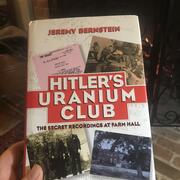This book is entitled Hitler’s Uranium Club: the secret recordings at Farm Hall. It is edited by Gerald Bernstein, writer for The New Yorker magazine, and a physicist as well.
It tells the story of the secret transcripts of conversations between captive German physicists in the second half of 1945, in England. They were held incommunicado from April 1945 until December 1945, first in France and then in England. They were continually monitored, without their knowing it. It is an illuminating narrative of intellectuals trying to come to terms with the Eagles they have done.
It’s especially interesting to listen to them after they hear of the nuclear bombing of Hiroshima. They have been generating accounts of how they had done nothing evil in Germany, that they knew what their superiors did not, that the bomb was technically impossible, and then they are both stupefied by the allies technical achievement at actually making a nuclear weapon, embarrassed at their own failure, and perhaps a little giddy at the opportunity to express moral outrage add the allies deliberate bombing of a civilian target.
In general the moments of moral revelation are rare, and most of their time is been spent in petty squabbling and dull, rancorous grousing about the conditions in which they are held. But there are occasionally interesting moments, and some devastating discoveries. There is a fascinating moment when Heisenberg talks to them about trying to help some Jews not be killed, and he mentions it with a great deal of casualness. Then Wirtz says this:
“We have done things which are unique in the world. We went to Poland and not only were the Jews in Poland, but for instance, the SS drove up to a girls school, fetched out the top class and shot them simply because the girls were high school girls in the intelligentsia and were to be wiped out. Just imagine if they had arrived in Heidelberg, drove up to the girls school and shot all the girls! That’s what we did.”
Notice the use of "we" here--a rare word in this book. I haven’t read the entirety of this book, but I have really good amount of it, and it is fascinating how uncommon the use of "we" is, particularly by a figure like Heisenberg. Most of the time, the participants speak of "they" and "I". A good reminder for me, maybe for you too.
I'd say "enjoy," but that's a bit off. Just know, it's a worthwhile read.
